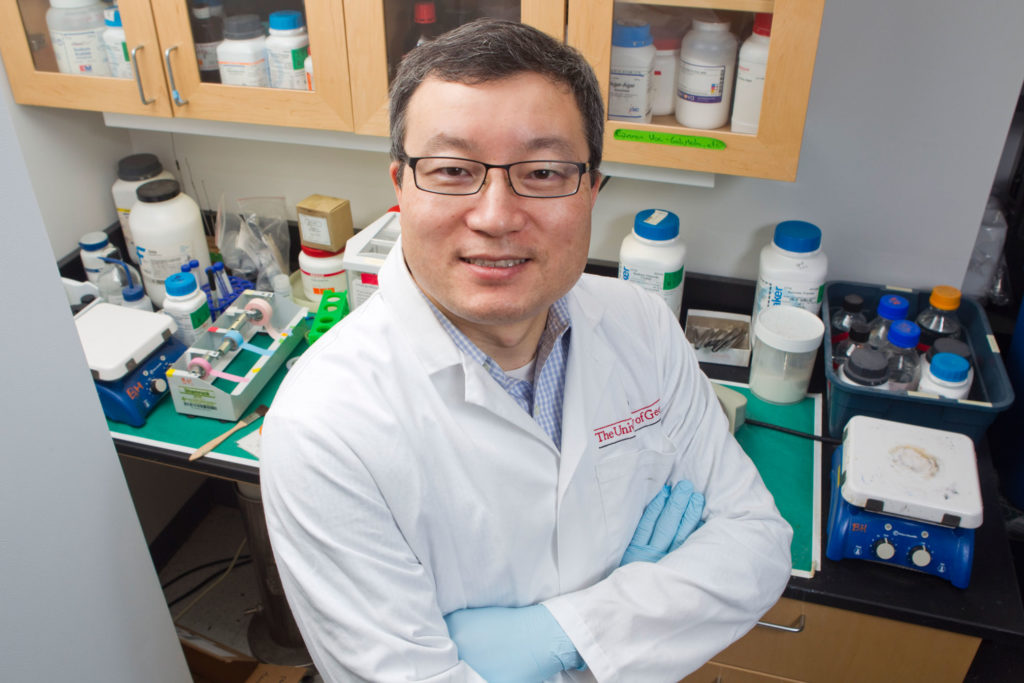Athens, Ga. – Almost all children are infected with respiratory syncytial virus by the time they are two. Most recover quickly from cold-like symptoms. But for others, RSV can cause serious lung infections, such as bronchiolitis and pneumonia, which lands an estimated 75,000 to 125,000 children in the hospital each year, according to the U.S. Centers for Disease Control and Prevention.
New research from the University of Georgia could lead to the first RSV vaccine-and keep many of those children out of the hospital.
“RSV is the most important cause of pediatric viral respiratory infection and is a major cause of morbidity and mortality among infants as well as immunocompromised subjects and the elderly,” said Biao He, a professor of infectious diseases in the UGA College of Veterinary Medicine and the study’s lead author. “Many other researchers tried to develop a RSV vaccine but were unsuccessful. Our approach is different from all previous attempts, and now we have shown it works in animals.”
Several approaches to vaccination have been evaluated over the years, but there are currently no licensed RSV vaccines and no effective treatments for severe RSV. A vaccine developed using formalin-inactivated RSV and tested in 1966 left children unprotected; many infants still caught RSV, suffered worse symptoms and had to be hospitalized. Two toddlers died from enhanced disease symptoms.
In He’s lab, the journey to a successful RSV vaccine-it has been tested and works in a mouse model-started with a virus that causes respiratory infection in dogs. Canine parainfluenza virus, also known as parainfluenza virus 5 (PIV5), can be modified to deliver antigens against pathogens like RSV.
Using genetic engineering, He and his team of researchers inserted genes coding antigens of RSV into PIV5, creating a recombinant vaccine. Placing just a few genes from RSV into the genome of PIV5, the carrier virus exposes a person’s cells to antigens of pathogenic virus, allowing them to generate immunity that will protect against future infections.
He’s research shows that a single dose of vaccine protected a mouse against RSV infection, according to results published in the April issue of Vaccine. In this case, the vaccine was administered through the mouse’s nose. Using the modified PIV5 as a delivery mechanism to generate immune responses in humans and other animals to important pathogens allows He’s team to create vaccines that will protect against a variety of current and future infectious agents.
Severe RSV infection can contribute to wheezing and asthma later in life. Unlike infection by other respiratory viruses, RSV does not induce long-lasting protective immunity against subsequent infection, so most individuals are infected multiple times throughout the course of their lives.
“Our hope is that this vaccine will protect people for life,” He said. “Even if we create a RSV vaccine that protects children and at-risk adults for only five years, that will be worth it.”
“PIV5-based vaccine is safe, stable, efficacious, cost-effective to produce and overcomes pre-existing anti-vector immunity,” said He, who also is the Fred C. Davison Distinguished University Chair in Veterinary Medicine and a member of the UGA Faculty of Infectious Diseases. “In this work, we have shown that PIV5-based RSV vaccine candidates have the potential to be an effective vaccine, providing an additional option for RSV vaccine development.”
Contributing UGA authors include Shannon I. Phan, Zhenhai Chen, Pei Xu, Zhuo Li, Xiudan Gao, Stephanie L. Foster, Ralph A. Tripp and Kaori Sakamoto. Michael Teng, University of South Florida, also contributed.
The full article is available at http://dx.doi.org/10.1016/j.vaccine.2014.03.049.
UGA College of Veterinary Medicine
The UGA College of Veterinary Medicine, founded in 1946, is dedicated to training future veterinarians, to conducting research related to animal and human diseases, and to providing veterinary services for animals and their owners. Research efforts are aimed at enhancing the quality of life for animals and people, improving the productivity of poultry and livestock, and preserving a healthy interface between wildlife and people in the environment they share. The College enrolls 102 students each fall out of more than 900 who apply. For more information, see www.vet.uga.edu.
